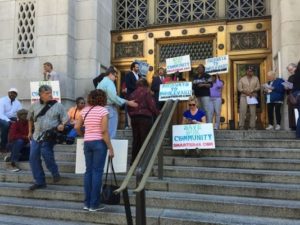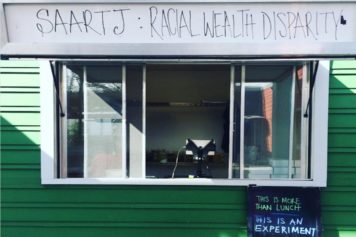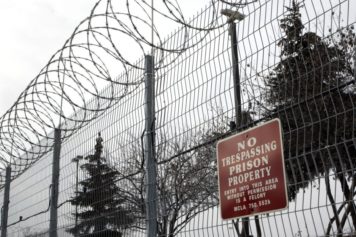
Plans to build the I-49 highway connector have sparked fierce protests by Allendale residents. (Photo by Lex Talamo/ The Shreveport Times)
Going against the wishes of her constituents, Shreveport, La., Mayor Ollie Tyler has sided with economic consultants to build a 3.6-mile connector highway that would slice through the largely Black, low-income neighborhood of Allendale.
The contested decision came Friday, Aug. 18, when the Metropolitan Planning Organization Transportation Policy Committee voted unanimously to move forward with the Shreveport I-95 highway project, The Shreveport Times reported. Under the route option selected by the committee, 3.6 miles of new highway would be built to fill a noted gap in I-49, cutting through the northeast area of the Allendale community.
Tyler greenlit the MPO committee’s move to approve the Allendale route during Friday’s meeting, a decision that was met with praise from representatives of several economic development organizations who favored the project as well, according to the newspaper.
“I strongly support this,” said Scott Martinez, president of the North Louisiana Economic Partnership. “Having great transportation makes us more attractive from an economic perspective.”
Allendale residents and supporters were incensed over the new project, however.
Plans to build the highway have sparked angry protests from locals who oppose the plan and don’t want to see a portion of their neighborhood demolished just to make way for a freeway. One of those angry residents is Dorothy Wiley, president of neighborhood group Allendale Strong.
Wiley, who moved to the neighborhood in 2006 after she evacuated New Orleans following Hurricane Katrina, has been mobilizing against the highway project for years, according to Streetsblog. Although her home isn’t in the direct path of the highway, she’s still outraged over plans to build it.
“I don’t want to live under or by a freeway,” Wiley told Streetsblog. “For me, no freeway should be coming through any community.”
Last year, economic development consultants with Louisiana-based Taimerica Management Company published a report stating that the $700 million project would have an estimated total economic impact of $892 million — double that of projected economic impacts under other development alternatives. Taimerica also predicted that the freeway would produce 30,000 new jobs and reduce travel times for daily commuters in the area.
Such gains are likely what led Tyler and other city leaders to back the controversial plan.
Despite these anticipated “benefits,” Wiley said she and her group will continue challenging a project that upholds the racist underpinnings of American urban highway development.
“They always want to find a Black community to bring it through,” she told Streetsblog. “These people been living there 50, 60 years. They don’t want to be uprooted.”
A final decision on the project isn’t expected until the end of 2018, The Shreveport Times reported. The decision on the route will ultimately be left up to the Federal Highway administration and the Louisiana Department of Transportation and Development.


